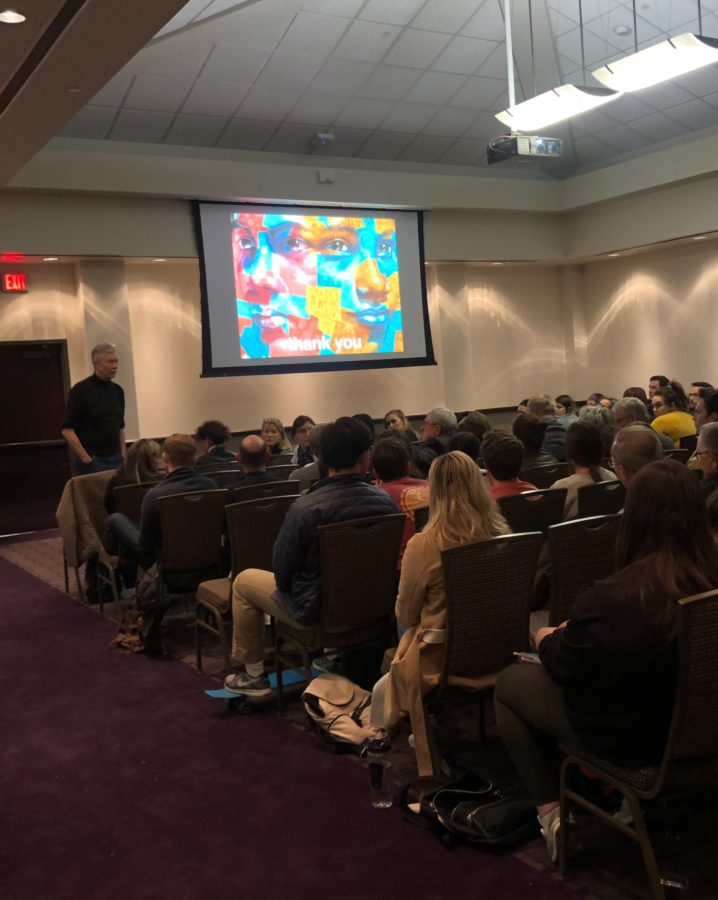TCU students and community members took a day out of their week to consider an issue that often lives in society’s shadow — human trafficking.
Also referred to as modern slavery, human trafficking holds an estimated 40.1 million people across the globe captive to owners through forced labor and sex trafficking for an average of $10 per person.
Students and community members took a cross-disciplinary look at the issue through discussions with experts brought in for the 18th annual Jim Wright Symposium, named for late TCU professor Jim Wright, a former Speaker of the House of Representatives.
Founder of The Net, Melissa Ice, and global human trafficking researcher and professor at the University of Nottingham, U.K., Kevin Bales, were two experts who shared personal stories of empowering survivors.
The Net is a local nonprofit that serves survivors of human trafficking through building personal relationships.
“The women that we serve, we initially meet them in jail,” Ice said. “We sit across from them in jail and in jail classes. When they get out, we’re getting coffee with them and meeting their children and getting to know their families.”
Likewise, Kevin Bales traveled straight to the heart, and the danger, of modern slavery.
He spent time undercover in the Middle East and Asia getting information for his book “Disposable People,” which was nominated for a Pulitzer Prize.
In a society that values rice fields over women, Bales walked both among pimps in Thailand who regularly kill women to make the others comply and into brothels to hear survivors’ stories.
“I went into all that thinking I can handle this, I’m tough enough for this,” Bales said. “I had done work on death row and been in some tough places. This was different, and this was worse, much worse.”
Photo by Olivia Wales
Bales has shared his research on human trafficking with millions through his TED talk, his non-profit organization, Free the Slaves, and at community discussions like the symposium.
TCU students and faculty found these experts’ messages eye-opening.
Spanish professor Karla O’Donald said that she attended the symposium to be able to equip her students to engage in conversations with survivors and educate them on the prevalence of human trafficking.
“We live in the TCU bubble and things just go right by us,” O’Donald said.
International Justice Mission, a student organization committed to fighting human trafficking, advocates to ensure that modern slavery isn’t another topic that slips by students unnoticed.
“Last semester I joined IJM and was amazed with how many people were involved in human trafficking and how few people even knew it still existed,” said Grace Martin, sophomore social work and Spanish double major. “Ever since then I have been wanting to learn more about what we can do to help people escape modern day slavery.”
Feb. 7 was national Shine a Light on Slavery Day, and IJM students advocated to end modern slavery by pouring red sand in the sidewalk cracks and drawing red X’s on their hands as part of the End It movement.
IJM officers Caroline Jones, Emma Scheer and Kyle Hepting advocate to end human trafficking through the national End It movement. Photo courtesy of Emma Scheer
Dr. Vanessa Bouché, assistant professor of political science and IJM advisor, referred to the fight against human trafficking as a marathon, not a sprint.
“It’s through events like [the symposium] that we realize we are not alone and we can keep going,” Bouché said.
TCU IJM students are running this marathon together in their daily advocacy on campus, but some students will be running the Cowtown Marathon on Feb. 24 to continue the fight against human trafficking.
They have raised $12,000 for the Net and Traffick911 through fundraising for their team called “Outrun Trafficking.”




